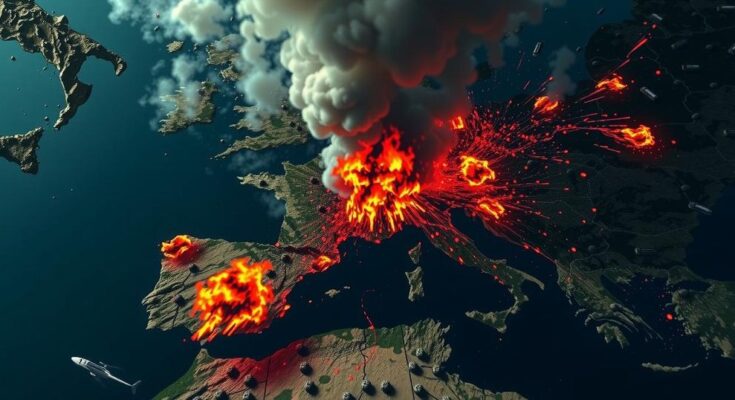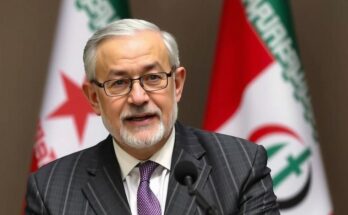Iran has alerted the UN about threats from Israel concerning its nuclear sites, amid heightened military activity in the Middle East. Israel expressed intentions to retaliate against Iran following missile attacks, while also conducting strikes in Lebanon, which resulted in civilian casualties. The humanitarian situation in Gaza continues to deteriorate, prompting urgent evacuations for medical care. The international community is increasingly concerned about the implications of these unfolding events.
The ongoing crisis in the Middle East is intensifying as Iran raises concerns about Israeli threats to its nuclear sites, warning the United Nations nuclear watchdog of potential aggression. Iranian Foreign Ministry spokesperson Esmaeil Baghaei conveyed during a news conference that such threats violate UN resolutions and have been formally communicated to the watchdog. The tensions escalated after a missile barrage from Iran on October 1, prompting Israel to declare intentions to strike back, potentially targeting nuclear facilities in Iran. In parallel developments, Israel has issued an apology for a recent attack in southern Lebanon that resulted in the deaths of three Lebanese soldiers. The Israeli military clarified that their operation was not aimed at the Lebanese army, asserting that they mistakenly targeted a vehicle associated with Hezbollah, which is vocally opposing Israeli actions. The humanitarian situation remains dire, as the World Health Organization prepares to evacuate 1,000 Palestinian women and children from Gaza for urgent medical treatment. WHO officials cited a pressing need for medical assistance amidst ongoing military actions that have reportedly targeted health facilities, exacerbating the crisis. Simultaneously, US defense officials reported the deployment of the Terminal High Altitude Area Defense (THAAD) missile system in Israel as a precautionary measure against perceived threats, particularly from Iran, which has increased missile activities in the region. Recent Israeli airstrikes focused on Hezbollah-affiliated financial institutions in Lebanon, marking a significant expansion of military operations. Despite warnings for civilians to evacuate, multiple strikes were reported in densely populated areas, highlighting the escalating conflict’s toll on civilian life and local communities. The UN human rights office has condemned Israel’s actions in Gaza, noting that indiscriminate bombings and targeted strikes on humanitarian facilities are exacerbating the humanitarian crisis and threatening civilian lives. As the situation continues to develop, diplomatic efforts for a ceasefire remain crucial, with US envoy Amos Hochstein scheduled to meet with Lebanese officials amidst ongoing hostilities.
The crisis in the Middle East, particularly between Israel and Iran, has been exacerbated by escalating military actions and retaliatory threats from both sides. Iran’s nuclear program remains a pivotal concern for Israel and the international community, leading to heightened tensions following missile launches attributed to Iran. Humanitarian issues in Gaza and Lebanon, especially concerning the civilian population, have garnered international attention as military operations intensify, raising fears of widespread human rights violations and displacement. The involvement of organizations like WHO and UN human rights offices underscores the urgent need for a robust humanitarian response amidst ongoing conflict.
In summary, the ongoing violence in the Middle East is characterized by increased military actions between Israel and Iran, as well as within Lebanon. Iran’s warnings to the UN about Israeli threats to its nuclear infrastructure add a layer of international concern to the situation. Concurrently, the humanitarian crisis in Gaza deepens and international agencies attempt to facilitate medical evacuations. Diplomatic efforts are essential to de-escalate tensions and address the urgent needs of affected populations. Ultimately, the safety of countless civilians hangs in the balance as the crisis develops.
Original Source: www.theguardian.com




